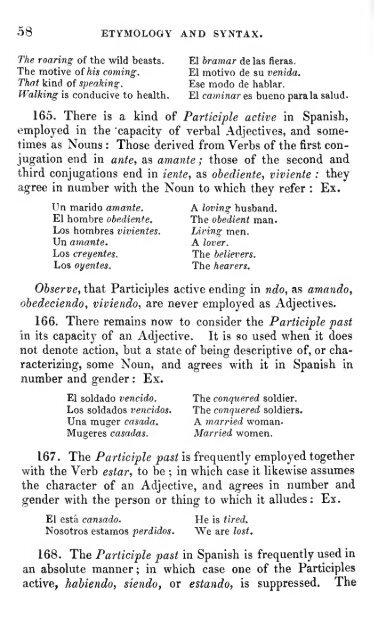A concise and simplified grammar of the Spanish language
A concise and simplified grammar of the Spanish language
A concise and simplified grammar of the Spanish language
Create successful ePaper yourself
Turn your PDF publications into a flip-book with our unique Google optimized e-Paper software.
58 ETYMOLOGY AND SYNTAX.<br />
The roaring <strong>of</strong> <strong>the</strong> wild beasts. El brarnar de las fieras.<br />
The motive oí his coming. El motivo de su venida.<br />
That kind <strong>of</strong> speaking. Ese modo de hablar.<br />
Walking is conducive to health. El caminar es bueno parala salud.<br />
165. There is a kind <strong>of</strong> Participle active in <strong>Spanish</strong>,<br />
employed in <strong>the</strong> 'capacity <strong>of</strong> verbal Adjectives, <strong>and</strong> sometimes<br />
as Nouns : Those derived from Verbs <strong>of</strong> <strong>the</strong> first conjugation<br />
end in ante^ as amante ; those <strong>of</strong> <strong>the</strong> second <strong>and</strong><br />
third conjugations end in iente, as obediente, viviente : <strong>the</strong>y<br />
agree in number with <strong>the</strong> Noun to which <strong>the</strong>y refer : Ex.<br />
Un marido amante. A loving husb<strong>and</strong>.<br />
El hombre obediente. The obedient man.<br />
Los hombres vivientes. Living men.<br />
Un amante. A lover.<br />
Los creyentes. The believers.<br />
Los oyentes. The hearers.<br />
Observe, that Participles active ending in ndo, as am<strong>and</strong>o,<br />
obedeciendo, viviendo, are never employed as Adjectives.<br />
166. There remains now to consider <strong>the</strong> Participle past<br />
in its capacity <strong>of</strong> an Adjective. It is so used when it does<br />
not denote action, but a state <strong>of</strong> being descriptive <strong>of</strong>, or cha-<br />
racterizing, some Noun, <strong>and</strong> agrees with it in <strong>Spanish</strong> in<br />
number <strong>and</strong> gender : Ex.<br />
El soldado vencido. The conquered soldier.<br />
Los soldados vencidos. The conquered soldiers.<br />
Una muger casada. A married woman.<br />
Mugeres casadas. Married women.<br />
167. The Participle past is frequently employed toge<strong>the</strong>r<br />
with <strong>the</strong> Verb estar, to be ; in which case it likewise assumes<br />
<strong>the</strong> character <strong>of</strong> an Adjective, <strong>and</strong> agrees in number <strong>and</strong><br />
gender with <strong>the</strong> person or thing to which it alludes : Ex.<br />
El está cansado. He is tired.<br />
Nosotros estamos perdidos. We are lost.<br />
168. The Participle past in <strong>Spanish</strong> is frequently used in<br />
an absolute manner ; in which case one <strong>of</strong> <strong>the</strong> Participles<br />
active, habiendo, siendo, or est<strong>and</strong>o, is suppressed. The

















